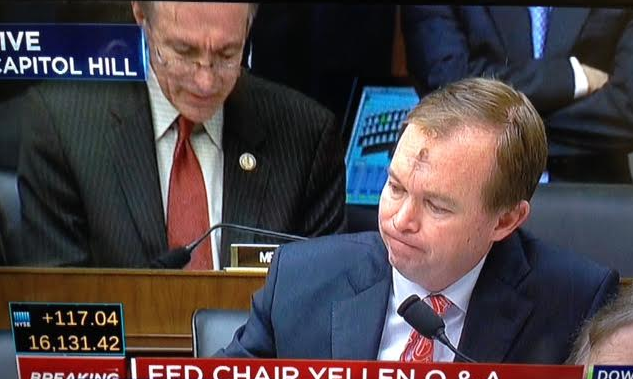Cheapshot II
The testimony is always fun to watch. It pays to stir the pot if you are a politician especially when speaking to a Fed chair. Heck, they really don't have control over what the Fed does. I personally think that is a good thing.
So the question was asked "What would the world have to look like to apply a rules based approach to conducting monetary policy?"
It is these questions which make you want to fire back, "What would the world have to look like to balance a budget?" but that aside, the answer was ultimately answered with the following: "The Fed shouldn't mechanically follow policy rules".
And this was the look of disgust....

In trading, I like to look at a set of indicators to determine bullish or bearish bias. If enough people do the same, it defines and limits risk. So I try to use tools that traders use because I believe smart traders lean against levels for entry, exit and confirmations. If you follow what I write, you get the idea....Systematic right? (more on that in a second).
The Fed will lean against levels as well. Employment. An Inflation target. But that does not mean it is totally systematic.
Back to trading. I lean against levels from tools but it does not mean you have to do the trade/to act (i.e, be systematic) Why the caveat? Because there is a thing called risk and there is a thing called fear. Fear is a function of risk and if fear is increased, people typically don't do well - myself included. Think of golf. Put water in front of a player and the ball finds the water (at least for me).
But....risk can be defined against the technical levels,why override it?
Because that is just market risk from the supply and demand flows. When it is just that "market risk" traders lean against levels, and either you lose a little or make more than a little.
However, there are other risks like event risk and liquidity risk. Event risk include economic indicators. It also is a Yellen testimony that goes on and on. Event risk is a carefully worded question that backs the chair in a corner....a cheapshot. It is a surprise comment or even misinterpreted comment. The liquidity risk will tend to also increase when event risk increases. Think choppy markets.
If event and liquidity risk is high or higher, it should influence your trading (it does mine). I am more cautious/patient. I may even choose to "not play". There are better times when risk is just "market risk". If I do play, trades might only be for a brief moment i.e., If it works good. If it doesn't get out and I will look to put the toe in at precise levels. Trade size might also be lower as a result of increased risk.
I think that is what the chair was saying. A system is ok, but it is not the answer. There are other risks in "the world we live in" that does have an impact. To have things rules based might not take into consideration some higher risks "over here" - like banking, commodity producers, China.
Now the Fed has made the mistake in the past with regard to systematic ways of doing things. I think there was a 6.5% unemployment target rate at one point (CLICK HERE for that reminder). You also don't want to be too sensitive to "stuff out there". But there are some things....
I have made mistakes too (and so will you). Every Unenjoyment....I mean unemployment....Day is a recipe for a trading disaster. Event and liquidity risk is simply too high and hard to quantify. Testimony day can be like a slow unemployment day. So trade if you must, but understand that you don't have to, or if you do, be more patient, pick your "systematic levels" but don't be so systematic you forget that risk is increased too.




